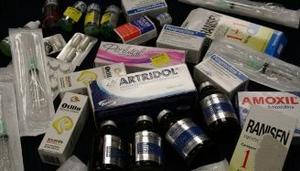Public healthCountering the threats of fake or substandard medications
No country acting alone can protect its citizens against the health risks posed by illegitimate medications, and reducing this problem requires international cooperation. A new study calls for global agreement on an international code of practice on drug quality. It also recommends establishing a mandatory drug tracking system and tightening the licensing requirements on medication wholesalers in the United States.

NRC calls for WHO to lead a global medication standards organization // Source: iprcenter.gov
No country acting alone can protect its citizens against the health risks posed by illegitimate medications, and reducing this problem requires international cooperation, says a new report from the Institute of Medicine. The report calls for global agreement on an international code of practice on drug quality. It also recommends establishing a mandatory drug tracking system and tightening the licensing requirements on medication wholesalers in the United States.
A National Research Council release reports that medicines often contain multiple ingredients that can come from more than one country, noted the committee that wrote the report. Substandard medications containing little or no active ingredients hasten drug resistance, do not treat disease, and increase the costs of health care. In addition, products that contain dangerous ingredients have sickened and killed people around the world. Fake versions of the cancer drug Avastin appeared in the United States in 2011 and 2012, for example, and similar problems occur even more frequently in poor countries, the committee found.
“Given the international nature of modern manufacturing and trade, every nation has a stake and a role to play in ensuring the production and sale of high-quality medications,” said committee chair Lawrence O. Gostin, O’Neill Professor of Global Health Law, Georgetown University Law Center, and director, World Health Organization (WHO) Collaborating Center on Public Health Law and Human Rights, Washington, D.C. “Falsified and substandard medicines are a grave public health problem because they are ineffective, promote drug resistance, and even cause severe illness and death, particularly in developing countries where they regularly flood the market. We’re calling on WHO, in collaboration with regulators, companies, and civil society worldwide, to adopt a global code of practice, build national regulatory capabilities, and promote international cooperation.”
WHO should lead the effort to develop a code of practice that includes guidelines on surveillance, regulation, and law enforcement, the report says. Similar codes on the marketing of breast milk substitutes and the recruitment of health workers have been effective in tackling problems of global consequence, the committee noted.
The report also recommends global adoption of the terms “substandard” and “falsified” to refer to products that pose a public health risk and urges all parties to refrain from using the term “counterfeit” except when specifically referring to trademark infringement. The overlap of legal trademark issues and public safety risks has made it hard for authorities to tackle either problem. Despite its broad use, “counterfeit” has
